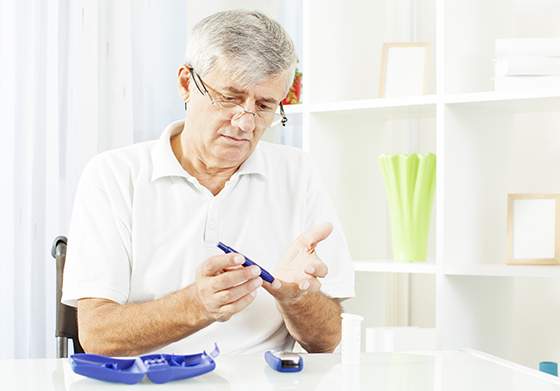Day-to-day tasks at home can be more difficult for elderly diabetics
As we age, everyday tasks get harder from complications with mobility, vision, and other underlying health factors. While some elderly adults have health concerns that can impact their lifestyles, many live fully independent. However, for elderly diabetics, day-to-day activities like managing blood glucose levels, taking an abundance of medications and eating an adequate diet can all be strenuous. To give families peace of mind for their senior loved one with diabetes, find out how having an in-home caregiver is the perfect solution to ensure they maintain a healthy lifestyle.
Having a caregiver in the home can:
Help Manage Blood Sugar Levels & Diabetic Medication
Maintaining an elderly diabetic’s blood sugar level is a full-time job. Having a caregiver present in the senior’s life will make managing this easier. Many diabetics have to take oral diabetes medications to help control blood sugar levels. For elderly adults, it can be hard to stick to a regular medication schedule and a caregiver can help by providing medication reminders. While your elderly loved one may generally be self-sufficient in their health-related responsibilities, there may also be sudden spikes or drops in their blood glucose that may leave them disoriented and unable to get the proper help. Having constant home care available allows their blood sugar levels and medication to be monitored, organized and adjusted accordingly, leaving no room for error.
Assist Elderly Diabetics with Vision & Mobility Limitations
Home care is essential for elderly adults with diabetes because this disease worsens complications with their vision and nerve endings. If the elder has been living with diabetes for a long time, it’s common for them to have nerve damage in their feet, making it hard for them to walk. They may also develop diabetic retinopathy, which is damage to the retina causing blindness. These side effects disrupt daily life and heighten possible risk factors, such as falling. However, if they have a caregiver that keeps their blood sugar in a healthy range, these risk factors will decrease. Your elderly family member will have the constant help they need so eye or nerve damage is not an issue, and any additional medical conditions, like diabetic retinopathy, can be prevented.
Help Seniors with Diabetes Maintain Healthy Meal Plans
One of the critical factors that affect elders’ blood glucose levels is diet. Home care support is one way to ensure the senior is getting adequate nutrition for their health needs. For instance, an older adult with diabetes should eat foods low in carbohydrates and high in protein and fat. Home care providers can step in and take the senior to the grocery store, prepare meals with them, and help them budget accordingly for what they need. All the while, elderly adults can learn how these healthy diet options help manage their diabetes, so they live longer and healthier.
Hiring a professional caregiver can ensure your loved one takes the steps necessary to manage their diabetes and stay as healthy as possible. Your elderly loved one will live a life of comfort, happiness and fun without family members worrying about their overall health and quality of life.
Download our family caregiver guide to less stress
Now more than ever, family caregivers are faced with the stress that comes with caring for an aging loved one. Our free Family Caregiver Stress Solutions Guide offers tips and strategies on how to accept and manage stress while you take on the responsibility of caregiving. Download Stress Solutions: A Family Caregiver Guide to Less Stress
